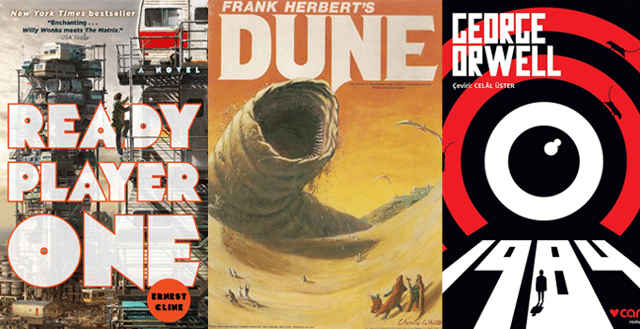If you’re a sci-fi lover thinking of writing your own sci-fi novel, then you’re in great company. Whether you’re more of a Ray Bradbury, an Octavia E. Butler, or a Terry Pratchett, sci-fi writing is an amazing adventure to embark on. Not just because many famous sci-fi stories like Star Wars are written as a literal adventure–it’s also because it’s a chance to create a new world, explore interesting ideas, and get to know characters while going with them on a journey.
The payoff of finishing a novel, even just a first draft, is incredible for these reasons and many more. But there’s a reason they call it “payoff”–and that’s because it’s a lot of work to write a novel!
If you’re looking to write your sci-fi novel in one month–say, for NaNoWriMo–then it’ll definitely take work. Luckily, we’ve put together some strategies you can use to get it done. Read on to learn more.

1: Half a year before you start: Read as much as you can
Before you even put pen to paper–or start typing away–you need to know what kind of book you want to write. And there’s basically nothing as inspiring for any writer as reading books they love. Re-read your favorites, and make a list of what you love about what they do.
Is it how they describe other worlds, how they write dialogue, or how much their characters leap off the page? Once you’ve put this list together, you’ll have an idea of the kind of novel you want to write. Read new books too, so that you can get a fresh perspective on new ways to write.
Considering that, in 2017, there were 5.15 million science fiction books sold in the US, there will be plenty of choices for you to choose from.
2: Two months before you start: Plan out your book
Now that you’ve figured out what you want your book to be about, it’s time to start thinking about what’s going to be in it. This means figuring out big things like setting, the general plot, and who your main characters are going to be. If you want to make your life a little easier, think about using three-act structure to create a chapter outline of your book. That way, you’ll know what you’re writing towards when you’re finally sitting down ready to start.
Think about your genre, too, and research how those are usually structured. If you’re writing a YA science fiction book, you’re in luck, considering that young adult fiction is the most requested genre, followed by fantasy second.
3: A month before you start: Plan your writing schedule and tweak your outline
Even before you start, you have to think about when and where you’re going to write. So once you’ve planned out your book generally, you can decide how many days a week you’re going to write, and whether you’re going to aim for word count or hours worked. Planning days off is key–otherwise, you’ll get burned out! The same goes for planning breaks while writing.
Using the Pomodoro method is useful for a lot of people. They even have Pomodoro method apps, like Be Focused, which has a 4.6 out of 5-star rating in the app store. Additionally, use this time to tweak your outline, as you’ll get more ideas for plot twists and big events as you get closer to the big day of getting started!
4: While writing: Write in the right place, and regularly
Make writing into a habit, whether that’s going on a run beforehand or making yourself a strong cup of coffee. Waking up at the same time every day to do it–or going into a cafe at 3 pm every day–will guarantee that your writing gets done. Don’t forget about the importance of choosing the perfect place for writing.
Having an organized desk that doesn’t distract you is a huge motivator. Turning off your phone while you’re writing, and blocking distracting websites, is essential, too. After all, the average adult internet user in 2017 spent 5.9 hours with digital media daily.
5: After writing: Take a break and get feedback
Finally, you’ve written your novel. It’s taken a month, and it’s been a crazy journey, both for yourself and for your characters. The smartest thing to do now is set some time aside and allow your mind to rest. There will be issues such as plot holes and character arcs that need more development, and while you spend some time away from the novel, your brain will subconsciously work on solving those issues.
In addition to taking a break, think about getting feedback from a local writing group, friends you trust, or workshop peers if you choose to pursue an MFA degree (which can be worth it when you’re paying a $95 application fee at Boston University in Massachusetts and getting fully funded for 1-2 years). Feedback is essential for editing your novel, just like Oberlo’s roundup of free video editing software is essential to anyone creating videos.
By taking these steps, you can write your sci-fi novel in a month, and make it even better once you’ve finished the first draft. Why have you decided to work on a novel, and has anyone author in particular inspired you?














Leave a Reply